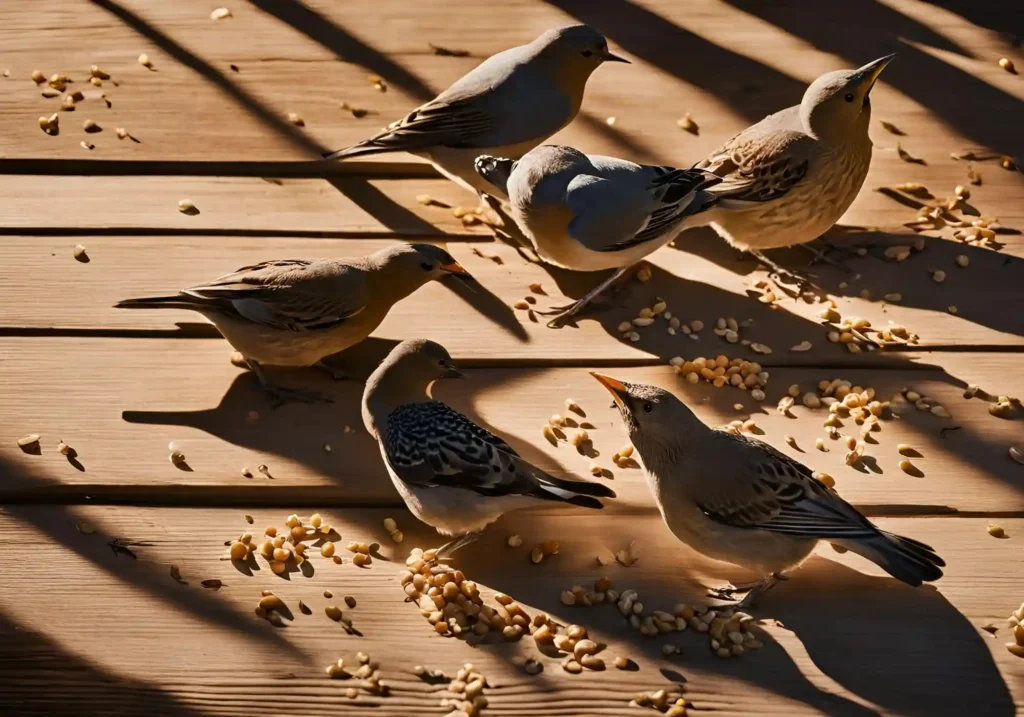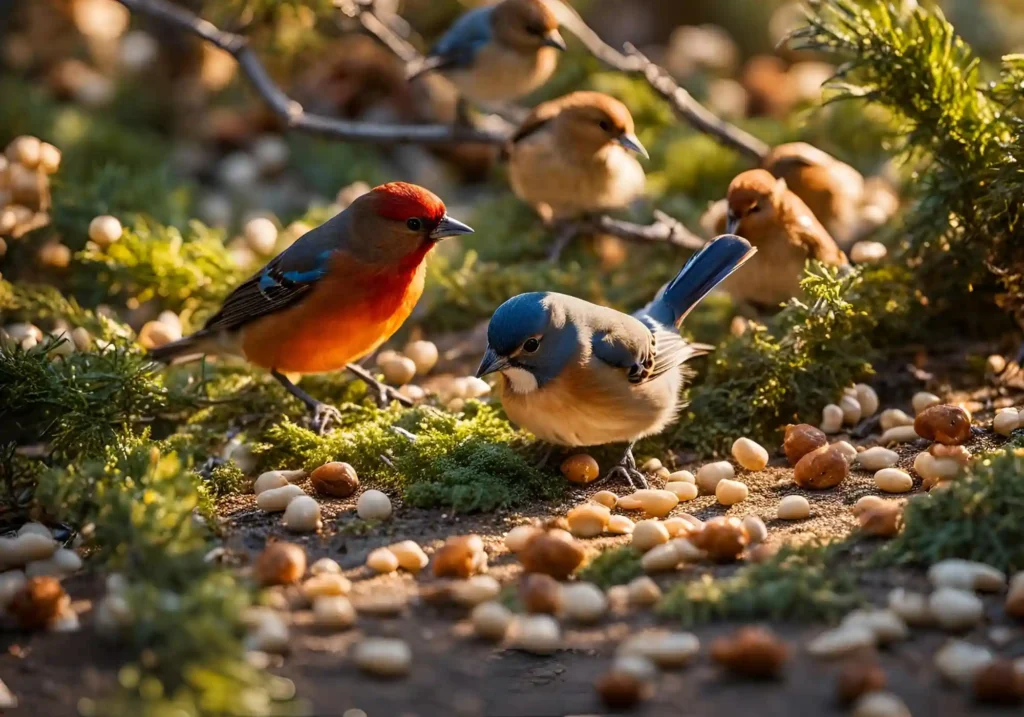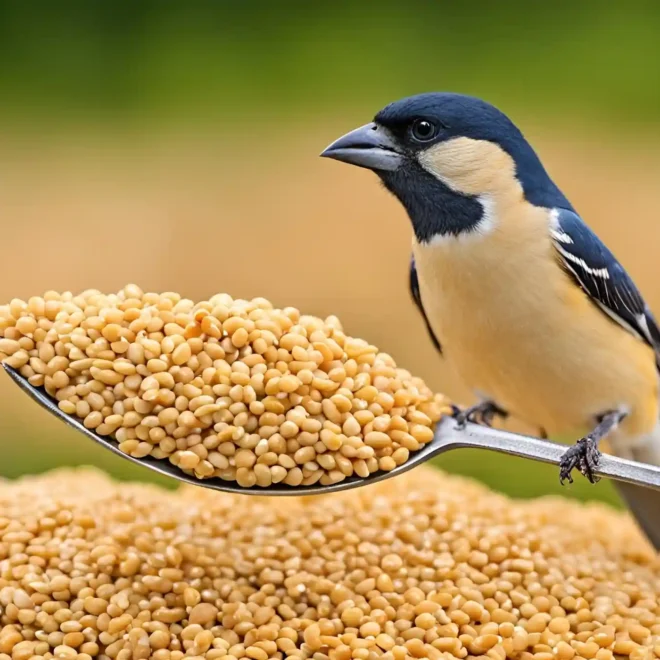When it comes to seeds, sesame seeds are a favorite for many of us, but are they safe for birds to eat? Birds are known to enjoy a variety of seeds, but it’s important to know which ones are beneficial and which might not be.
If you’ve ever thought about offering sesame seeds to your feathered friends, you may wonder if they’re a healthy choice.
Let’s find out if sesame seeds can be part of a bird’s diet and how they might benefit from them!
Do Birds Eat Sesame Seeds?
Yes, birds can eat sesame seeds, and they generally enjoy them. Sesame seeds are small and packed with nutrients, making them a suitable food for many bird species.
They contain healthy fats, protein, and other vitamins that can benefit birds. However, like with any seed, they should be fed in moderation to avoid overloading birds with fat, which could lead to obesity in pet birds or negatively impact wild birds.
Sesame seeds can be a great addition to a bird’s diet, but they should be offered alongside a variety of other foods.
How To Serve Sesame Seeds To Birds?
When serving sesame seeds to birds, it’s best to mix them with other seeds or bird food to ensure that the bird is getting a balanced diet. You can sprinkle sesame seeds over bird feeders or directly on the ground for garden birds to find.
If you are feeding pet birds, you can also sprinkle the seeds over their regular bird food. For extra nutrition, you could offer sprouted sesame seeds, which can be more beneficial than raw seeds. Always ensure the seeds are fresh and free from mold before serving.
Can Birds Eat Raw Sesame Seeds?
Yes, birds can eat raw sesame seeds without any issue. In fact, raw sesame seeds are often preferred because they retain all of their natural nutrients.
Raw seeds provide birds with essential fats, proteins, and minerals that are important for their health. However, because sesame seeds are high in fat, they should only be a part of a bird’s diet and not the main food source.
Birds like finches, sparrows, and parrots can benefit from raw sesame seeds, but always ensure they are served in moderation.
Will Wild Birds Eat Sesame Seeds?
Yes, wild birds will eat sesame seeds if they come across them. While sesame seeds may not be a staple in a wild bird’s natural diet, they are still a nutritious and appealing option for birds that visit your backyard feeder.
Birds such as finches, sparrows, and doves may be drawn to sesame seeds, especially when mixed with other seeds they enjoy.
However, you may need to monitor how often you put them out because sesame seeds are small and can easily be spilled or wasted by larger birds.
Can Birds Eat Hulled Sesame Seeds?
Yes, birds can eat hulled sesame seeds, and many species will enjoy them. Hulled seeds have had their outer shell removed, making them easier for smaller birds to eat.
Without the tough hull, birds can digest hulled sesame seeds more easily, allowing them to get the full nutritional benefits of the seed.
However, some nutrients found in the hull may be lost when the seeds are hulled, so offering a mix of both hulled and unhulled seeds can provide birds with a more complete range of nutrients.
Can Garden Birds Eat Sesame Seeds?

Garden birds, such as sparrows, finches, and doves, can eat sesame seeds. These small seeds are easy for most garden birds to consume and can be an appealing addition to bird feeders.
You can either place sesame seeds in your bird feeder or scatter them around your garden for the birds to find. Just like with other seeds, garden birds will enjoy sesame seeds as part of a varied diet, but it’s important not to rely solely on sesame seeds to feed them.
Mixing sesame seeds with other types of bird food will ensure that your garden birds stay healthy.
Can Parrots Eat Sesame Seeds?
Yes, parrots can eat sesame seeds, and they often enjoy them as a tasty treat. Sesame seeds are rich in healthy fats, protein, and calcium, all of which are beneficial for parrots.
You can offer sesame seeds to your parrot either raw or mixed with their regular bird food. Parrots have strong beaks that allow them to easily crack open and consume small seeds like sesame seeds.
Just remember to offer them in moderation since sesame seeds are high in fat, and too much fat can lead to weight gain in pet birds.
Can Wild Birds Eat Black Sesame Seeds?
Yes, wild birds can eat black sesame seeds just like they would eat white or hulled sesame seeds. Black sesame seeds are similar to white sesame seeds in terms of nutritional value, containing healthy fats, protein, and essential minerals.
Wild birds that visit your garden, such as finches, sparrows, and other seed-eating birds, are likely to enjoy black sesame seeds if they find them in your bird feeder.
Black sesame seeds can be a good option if you want to offer a more diverse range of seeds in your feeder.
Are Roasted Sesame Seeds Safe For Birds?
Roasted sesame seeds can be safe for birds, but raw seeds are generally preferred because roasting may strip away some of the nutrients birds need.
Also, roasted seeds that are salted or flavored are not suitable for birds. Salt and other additives can be harmful to birds, so if you choose to offer roasted sesame seeds, make sure they are plain and unsalted.
Raw sesame seeds, on the other hand, retain more of their natural nutrients and are a better choice for feeding birds.
Do Birds Prefer Hulled Or Unhulled Sesame Seeds?
Birds can eat both hulled and unhulled sesame seeds, but smaller birds may prefer hulled seeds because they are easier to eat. Hulled seeds have had their outer shell removed, making them more digestible for some bird species.
Larger birds with stronger beaks, such as parrots, might not have any trouble eating unhulled seeds.
Offering a mix of both hulled and unhulled sesame seeds can cater to a wider variety of bird species, ensuring that all types of birds can enjoy this nutritious food.
Which Bird Species Eat Sesame Seeds?
Various bird species enjoy sesame seeds, including parrots, finches, sparrows, and doves. These birds have a diet that often includes seeds, nuts, and grains, so sesame seeds are a natural addition to their meals.
Wild birds that visit backyard feeders may also enjoy sesame seeds when offered as part of a seed mix. While not all bird species will be attracted to sesame seeds, those that do eat seeds as a regular part of their diet are likely to enjoy sesame seeds as well.
Can Sesame Seeds Cause Health Issues In Birds?
Sesame seeds are generally safe for birds to eat, but like any food, they should be fed in moderation. Because sesame seeds are high in fat, overfeeding them can lead to obesity or other health issues, particularly in pet birds.
If fed too often, sesame seeds might contribute to an unbalanced diet, which could lead to deficiencies in other nutrients that birds need. It’s important to make sure that sesame seeds are only one part of a bird’s diet, not the main source of nutrition.
How often should I feed sesame seeds to birds?
Sesame seeds should be fed to birds occasionally, not as a staple of their diet. Offering sesame seeds a few times a week is generally a good balance.
This allows birds to enjoy the seeds and benefit from their nutritional value without consuming too much fat.
For pet birds, sesame seeds can be given as a treat alongside their regular bird food, but make sure their main diet consists of a variety of foods, such as seeds, grains, fruits, and vegetables.
Are Sesame Seeds Nutritious For Birds?
Yes, sesame seeds are quite nutritious for birds. They are packed with healthy fats, protein, calcium, and other essential vitamins and minerals that can support a bird’s overall health.
These seeds can help with feather growth, bone strength, and energy levels. However, due to their high-fat content, it’s important to offer them in moderation, especially for pet birds.
When provided as part of a balanced diet, sesame seeds can be a great source of nutrition for both pet and wild birds.
Can Baby Birds Eat Sesame Seeds?

Baby birds should not eat sesame seeds until they are old enough to handle solid foods. Their digestive systems are still developing, and they usually rely on regurgitated food from their parents or special formula when raised in captivity.
Once young birds are ready to start eating solid foods, smaller seeds like sesame seeds can be introduced gradually. It’s also important to crush or grind the seeds to make them easier for baby birds to eat and digest.
Do Sesame Seeds Need To Be Mixed With Other Bird Food?
Yes, it’s a good idea to mix sesame seeds with other bird food to ensure a balanced diet. Birds need a variety of nutrients, and while sesame seeds provide healthy fats and minerals, they lack some essential vitamins and proteins that birds get from other seeds, fruits, vegetables, and grains.
Mixing sesame seeds with sunflower seeds, millet, or bird pellets will help provide a more complete diet, ensuring that the birds are not missing out on important nutrients.
Can Sesame Seeds Go Bad In Bird Feeders?
Yes, sesame seeds, like any other seeds, can go bad if they are left out for too long in bird feeders. They can become moldy, especially in damp conditions, which can be harmful to birds if consumed.
It’s important to regularly clean out bird feeders and check that the seeds are fresh. If the seeds have a strange smell or look discolored, they should be replaced.
Keeping bird feeders clean and dry helps prevent the seeds from spoiling and ensures that the birds are eating safe, healthy food.
Are Sprouted Sesame Seeds Good For Birds?
Sprouted sesame seeds can be an even more nutritious option for birds compared to raw seeds. Sprouting increases the availability of certain nutrients, making the seeds easier to digest and more beneficial for birds.
Sprouted seeds are rich in vitamins, enzymes, and antioxidants, which can support a bird’s immune system and overall health.
Birds that eat sprouted sesame seeds can get a boost of nutrition that helps with their energy levels, feather quality, and growth.
Do Birds Need More Water When Eating Sesame Seeds?
Birds should always have access to fresh water, but they may need more water when eating seeds like sesame seeds because seeds can be dry.
Consuming dry seeds can increase a bird’s need for hydration to aid in digestion and prevent dehydration.
Whether you’re feeding pet birds or wild birds, providing a clean water source alongside their food is essential for their health. Drinking enough water also helps birds process and absorb the nutrients from the seeds they eat.
Can Birds Choke On Whole Sesame Seeds?
While it’s uncommon for birds to choke on sesame seeds due to their small size, there is always a small risk when feeding birds any solid food.
Smaller birds may have difficulty swallowing whole seeds, so it’s a good idea to offer crushed or ground sesame seeds, especially for baby birds or species with smaller beaks.
Larger birds, such as parrots and doves, can usually handle whole sesame seeds without any issues, but it’s still important to monitor their eating habits to ensure they are safe.






